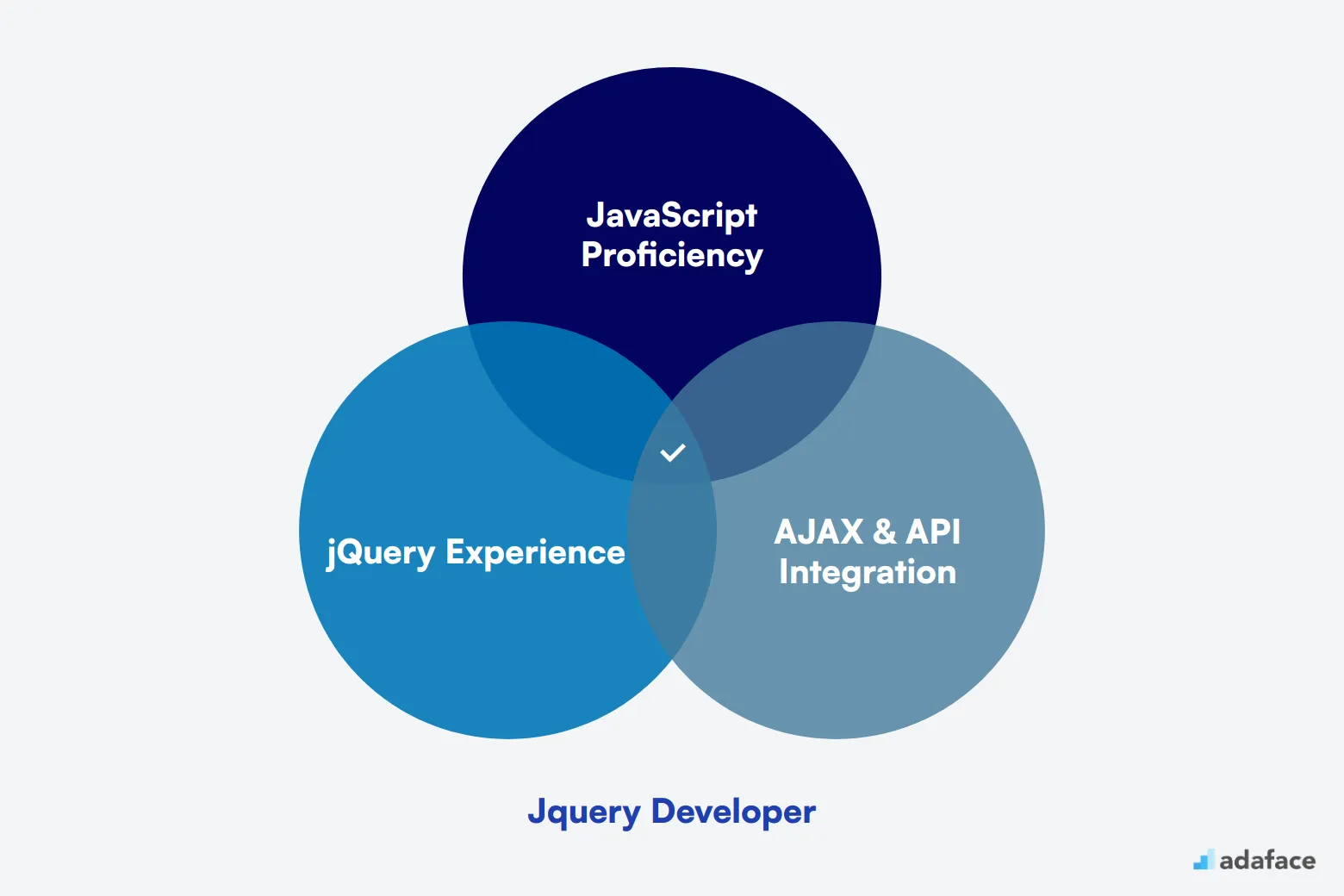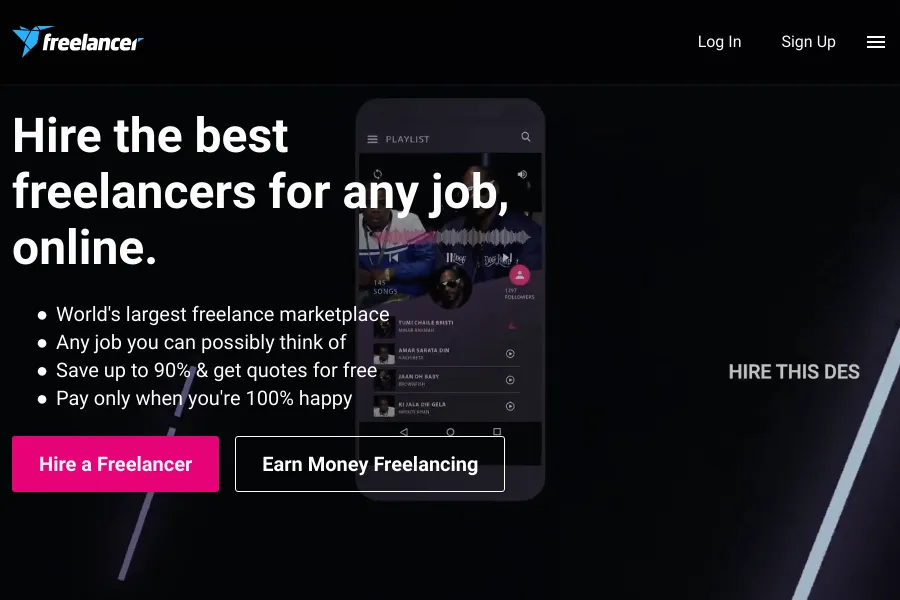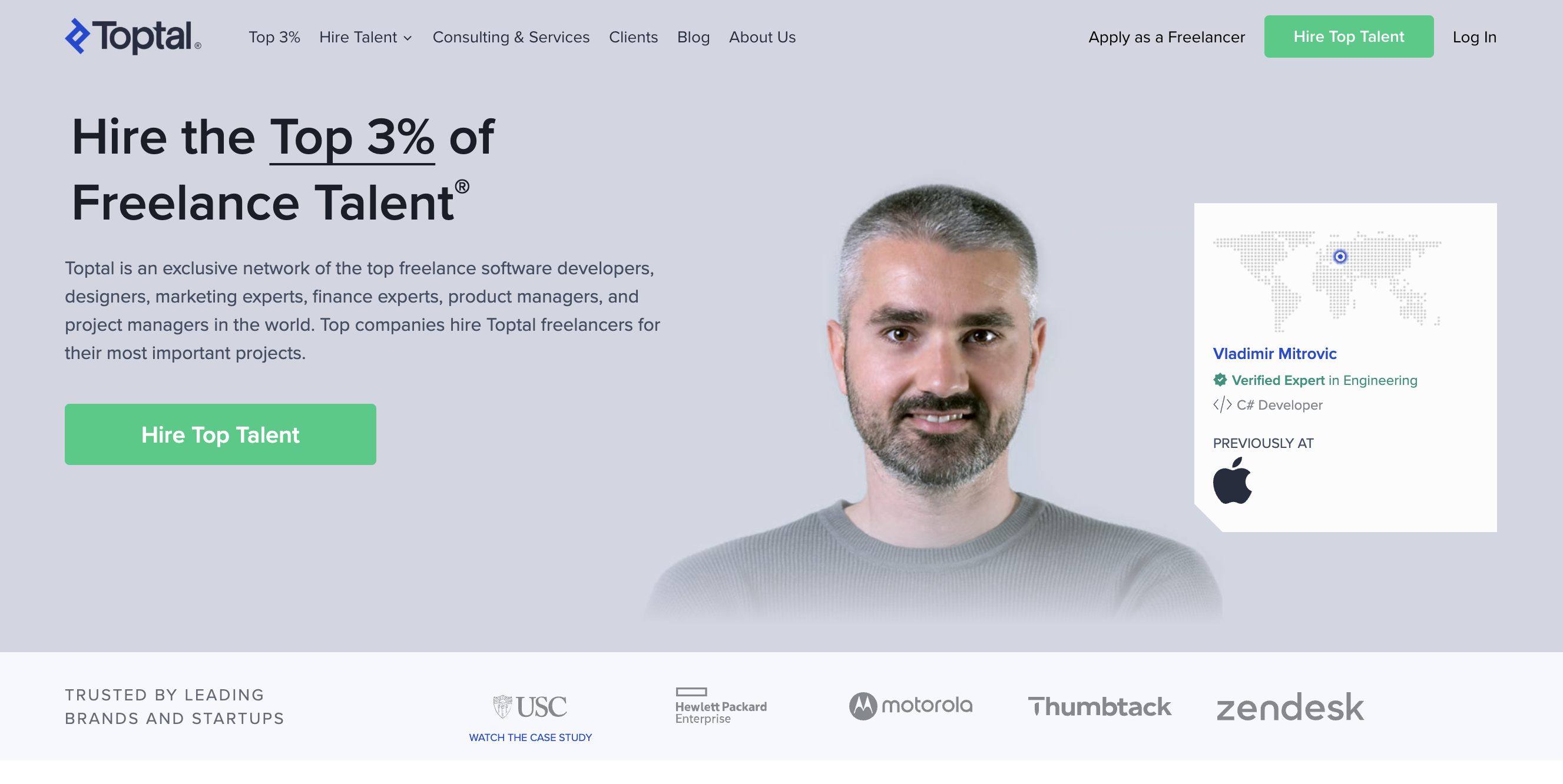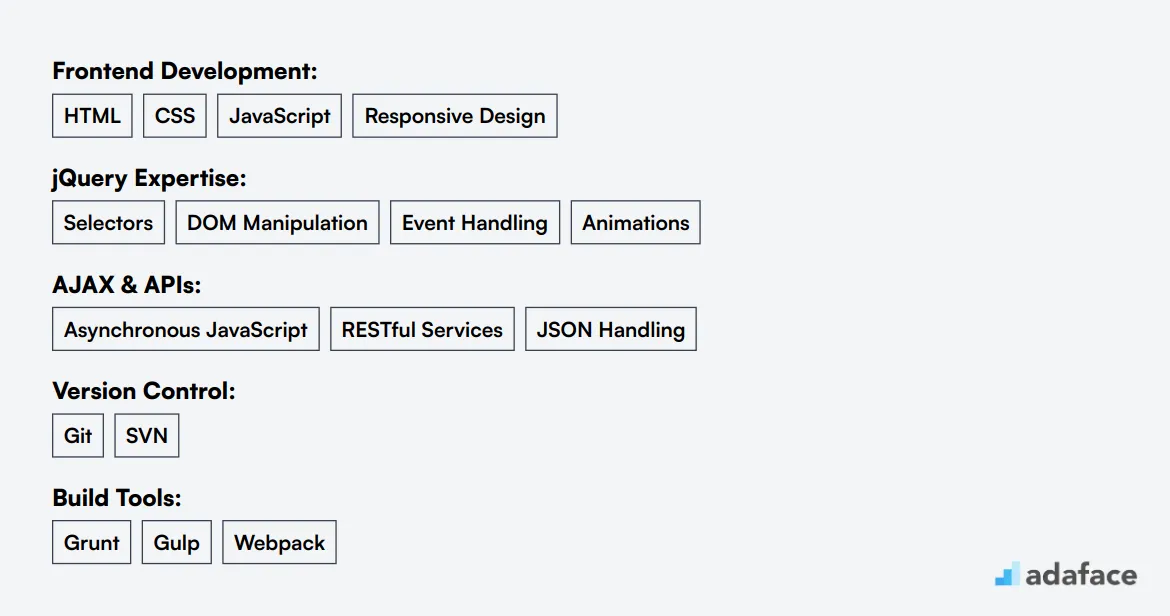Hiring a jQuery developer can make a significant difference in the technological capabilities of your business. These developers bring expertise in enhancing web functionality and creating seamless user experiences. Yet, many companies struggle to find candidates who not only possess technical proficiency in jQuery but also understand how to integrate these skills into broader business objectives. It's not just about coding; it's about fitting the right coder into your company's culture and vision.
In this blog post, we will guide you through the process of hiring a jQuery developer, from crafting the perfect job description to selecting suitable screening tests and interview strategies. We'll also touch on key distinctions between junior and senior developers and suggest platforms where you can find qualified candidates. Additionally, explore our list of jQuery interview questions to refine your hiring process.
Table of contents
Why Hire a jQuery Developer?
To determine if you need a jQuery developer, start by identifying specific web development challenges your company faces. For instance, you might need to enhance user interactions on your website or streamline complex JavaScript code.
Consider use cases where jQuery can make a significant impact:
- Simplifying AJAX calls for smoother data retrieval
- Creating responsive and mobile-friendly designs
- Implementing dynamic content updates without page reloads
Before committing to a full-time hire, assess your project scope and long-term needs. For short-term or specialized projects, you might consider working with a freelance jQuery developer or agency first to evaluate the potential benefits for your business.

Jquery Developer hiring process
Hiring a jQuery Developer can take about 4 to 8 weeks, depending on your organization's efficiency. Here’s a streamlined overview of the steps involved in the hiring process.
- Draft a precise job description: Before you start, make sure to create a clear and detailed job description that outlines the skills and responsibilities required for the role. Post this on relevant job boards to attract candidates.
- Resume collection and shortlisting: Expect to receive applications within the first week. Spend the next few days reviewing resumes to shortlist candidates based on their experience and skills.
- Skill assessment: Following shortlisting, move on to technical assessments. You can use coding tests to evaluate their proficiency in jQuery. This phase can take about a week to gather and analyze results.
- Interviews: Candidates who perform well in assessments should be invited for interviews. Prepare a mix of technical and behavioral questions to gauge their fit within the team and company culture.
- Offer stage: Finally, select the best candidate and present a job offer. Ensure that you provide all necessary details about the role to facilitate their decision-making process.
In summary, the jQuery Developer hiring process typically spans 4 to 8 weeks. Expect to invest time in crafting the right job description, conducting assessments, and interviewing candidates. We will expand on each of these steps with practical checklists and tips for a smoother hiring experience.
Key Skills and Qualifications for Hiring a jQuery Developer
When hiring a jQuery Developer, it’s important to create a clear candidate profile tailored to your specific needs. One common mistake is assuming that all jQuery skills are interchangeable; what may be necessary for one company could be a bonus for another. Understanding the difference between required and preferred skills can help you attract the right talent.
Below is a breakdown of essential skills and qualifications to consider:
| Required Skills | Preferred Skills |
|-----------------------------------------------------------|-----------------------------------------------------------|
| Proven experience with jQuery in a professional setting | Experience working with RESTful APIs |
| Strong knowledge of HTML, CSS, and JavaScript | Understanding of other JavaScript frameworks like Angular, React, or Vue.js |
| Experience with AJAX and asynchronous request handling | Experience with version control systems such as Git |
| Ability to write clean, maintainable, and efficient code | Familiarity with front-end build tools, such as Grunt or Gulp.js |
| Familiarity with cross-browser compatibility issues | Experience with responsive and adaptive design |
This matrix can guide your selection process and help ensure you find a candidate who not only fits your technical requirements but also aligns with your team's workflow. For more resources on technical screening, visit Adaface's blog on technical screening.
| Required skills and qualifications | Preferred skills and qualifications |
|---|---|
| Proven experience with jQuery in a professional setting | Experience working with RESTful APIs |
| Strong knowledge of HTML, CSS, and JavaScript | Understanding of other JavaScript frameworks like Angular, React, or Vue.js |
| Experience with AJAX and asynchronous request handling | Experience with version control systems such as Git |
| Ability to write clean, maintainable, and efficient code | Familiarity with front-end build tools, such as Grunt or Gulp.js |
| Familiarity with cross-browser compatibility issues and ways to work around them | Experience with responsive and adaptive design |
How to Write an Effective jQuery Developer Job Description
Once you've defined the ideal candidate profile for your jQuery Developer role, it's time to craft a compelling job description. A well-written JD attracts the right talent and sets clear expectations. Here are some quick tips to help you create an impactful jQuery Developer job description:
- Highlight key responsibilities: Clearly outline the primary tasks, such as developing and maintaining jQuery-based applications, optimizing website performance, and collaborating with cross-functional teams.
- Balance technical skills with soft skills: While emphasizing jQuery proficiency, also mention the importance of problem-solving abilities and teamwork.
- Showcase your company's unique selling points: Highlight exciting projects, growth opportunities, or any standout aspects of your work environment that would appeal to top jQuery talent.
- Be specific about requirements: List must-have skills like advanced JavaScript knowledge, experience with jQuery plugins, and familiarity with responsive design techniques.
10 platforms to hire jQuery Developers
Now that you have a well-crafted job description, it's time to source candidates by listing on job platforms. This step is crucial for attracting the right jQuery developers, whether you're looking for freelancers or full-time employees. Here's a guide to help you navigate through the top platforms for hiring jQuery talent.
Upwork
Ideal for hiring freelance jQuery developers for short-term or project-based work.

Freelancer
Great for finding skilled freelancers for project-based jQuery development tasks.

Toptal
Offers top-tier freelancers and full-time developers for high-quality jQuery development tasks.

Beyond our initial three choices, platforms like Upwork, Freelancer, and Toptal cater to both freelance and full-time needs, offering access to top-tier talent. LinkedIn and Indeed are perfect for posting full-time or part-time roles, while Glassdoor provides useful insights into company culture and salary. If you're focused on startup environments, Hired and AngelList are tailored for you. For remote work arrangements, consider platforms like RemoteTechJobs and FlexJobs, which specialize in flexible and remote roles.
How to Screen jQuery Developer Resumes
Resume screening is the first step in discovering talent and it's where you initially narrow down the pool of applicants. With jQuery developers, this process can help you focus on candidates who truly match your needs, before moving on to more in-depth interviews.

Start by manually screening resumes for key skills. Look for terms like jQuery expertise, JavaScript proficiency, and AJAX & API integration. Shortlist resumes that mention these skills as they are aligned with the required skills and qualifications for a jQuery developer role.
Incorporating AI tools like Claude or Chat GPT can streamline this process. These tools allow you to input the desired keywords and automatically screen resumes for relevant experience and skills, saving you a lot of time. A proper prompt can help the AI understand exactly what you are looking for.
Here's a sample AI prompt to help with screening jQuery developer resumes:
TASK: Screen resumes to match job description for jQuery developer role
INPUT: Resumes
OUTPUT: For each resume, provide following information:
- Email id
- Name
- Matching keywords
- Score (out of 10 based on keywords matched)
- Recommendation (detailed recommendation of whether to shortlist this candidate or not)
- Shortlist (Yes, No or Maybe)
RULES:
- If you are unsure about a candidate's fit, put the candidate as Maybe instead of No
- Keep recommendation crisp and to the point.
KEYWORDS DATA:
- jQuery (Selectors, DOM Manipulation, Event Handling)
- JavaScript (Proficiency, AJAX & APIs)
- HTML/CSS (Responsive Design, Cross-Browser Compatibility)
For more structured assessments, consider using online coding tests to further evaluate candidates.
Recommended Skills Tests to Screen jQuery Developers
When hiring a jQuery developer, skills tests are a recommended step to evaluate candidates beyond their resumes. These tests ensure your candidates have the necessary technical skills to contribute effectively to your projects. Here are some suggested skills tests for assessing jQuery developers:
jQuery Online Test: This test evaluates candidates on their understanding and application of jQuery. It's perfect for identifying those who can leverage the library to create interactive and dynamic web pages while maintaining code quality. jQuery Online Test.
JavaScript Online Test: As jQuery is built on JavaScript, assessing candidates' JavaScript knowledge is crucial. This test measures their proficiency in JavaScript fundamentals, ensuring they can handle jQuery's underpinnings. JavaScript Online Test.
Front-End Developer Test: This test covers various aspects of front-end development, including HTML, CSS, and JavaScript. It helps identify developers who can integrate jQuery with other front-end technologies to build cohesive user interfaces. Front-End Developer Test.
Web Developer Online Test: Focusing on the broader skills required for web development, this test assesses candidates' knowledge beyond jQuery, ensuring they have a well-rounded skill set to tackle different web projects. Web Developer Online Test.
JavaScript HTML React Test: As React is a popular library for building user interfaces, this test evaluates candidates' ability to integrate jQuery with React, providing a flexible approach to modern web development. JavaScript HTML React Test.
Case Study Assignments to Hire jQuery Developers
Case study assignments are a valuable tool for evaluating jQuery developers, providing insights into a candidate's problem-solving skills and technical prowess. However, they do have drawbacks, such as the lengthiness of the task, which can lead to low candidate completion rates and the risk of losing top talent. Despite these challenges, carefully crafted case studies can be instrumental in the hiring process.
Interactive Form Building: This case study involves designing and implementing a responsive form using jQuery. It tests a candidate's ability to manipulate the DOM efficiently and handle user interactions, making it a perfect assignment to evaluate front-end fluency. The ability to create user-friendly forms is a key skill outlined in jQuery developer job descriptions.
Data Visualization: Candidates are tasked with creating a dynamic chart using jQuery and a charting library. This assignment assesses their capability to work with libraries and handle data rendering, crucial for building interactive applications.
AJAX-based To-Do App: This involves creating a simple to-do list application with AJAX calls to fetch and update data. It evaluates the candidate's ability to implement asynchronous operations and update the UI dynamically, skills that are highlighted in jQuery developer skills requirements.
Structuring Technical Interviews for jQuery Developers
After candidates pass the initial jQuery skills tests, it's crucial to conduct thorough technical interviews. These interviews help assess a candidate's problem-solving abilities and depth of knowledge, which may not be fully captured in automated tests. Let's explore some key questions to ask during these interviews.
- Can you explain the difference between '$(document).ready()' and 'window.onload'?
- How would you optimize jQuery selector performance?
- What's the purpose of 'event delegation' in jQuery?
- Can you describe a situation where you'd use 'promise' in jQuery?
- How would you handle cross-domain Ajax requests using jQuery?
- What are some alternatives to jQuery and when would you choose them over jQuery?
These questions help evaluate a candidate's understanding of jQuery fundamentals, performance optimization, event handling, asynchronous programming, and their awareness of the broader front-end ecosystem.
What's the difference between a Junior jQuery Developer and a Senior jQuery Developer?
Many organizations often confuse junior and senior jQuery developers, primarily due to the lack of standardized criteria for evaluating experience levels. While both roles involve working with jQuery, their responsibilities, skills, and expectations differ significantly.
A Junior jQuery Developer typically has 0-2 years of experience and possesses fundamental knowledge of jQuery and JavaScript. Their work involves simple to moderate project complexities, where they contribute as individual contributors, often guided in problem-solving. Their skill set includes basic to intermediate jQuery proficiency, alongside familiarity with HTML and CSS.
In contrast, a Senior jQuery Developer brings 5 or more years of experience to the table, often possessing advanced to expert-level jQuery skills. They handle complex and large-scale projects, often serving as a team lead or mentor. Their deep understanding of JavaScript and additional technologies such as AJAX, JSON, and REST APIs enables them to tackle independent complex problem-solving, providing strategic insights and leadership.
| Junior jQuery Developer | Senior jQuery Developer | |
|---|---|---|
| Years of Experience | 0-2 years | 5+ years |
| Education Level | Bachelor's degree | Bachelor's or Master's degree |
| jQuery Proficiency | Basic to intermediate | Advanced to expert |
| JavaScript Knowledge | Fundamental | In-depth |
| Project Complexity | Simple to moderate | Complex and large-scale |
| Leadership Role | Individual contributor | Team lead or mentor |
| Problem-Solving Skills | Guided problem-solving | Independent complex problem-solving |
| Additional Technologies | HTML, CSS | HTML, CSS, AJAX, JSON, REST APIs |
What are the ranks of jQuery Developers?
When it comes to hiring a jQuery Developer, understanding the various levels within this specialization can be confusing. It's important to distinguish between different roles to ensure you're hiring talent that matches your project's needs.
Junior jQuery Developer: This is an entry-level position for individuals who are just starting in the world of jQuery. They typically support more experienced developers by writing basic scripts and performing minor layout adjustments. They are expected to follow instructions closely and progressively develop their coding skills.
Mid-Level jQuery Developer: At this stage, developers have gained moderate experience and can handle more complex tasks independently. They are responsible for optimizing website interactions and ensuring seamless UI/UX. They also assist in testing and debugging code to improve performance.
Senior jQuery Developer: Senior developers are experts in jQuery and play a key role in architecting solutions. They often lead projects and mentor junior developers. Their responsibilities include optimizing existing codebases and integrating jQuery with other technologies. Companies often rely on their expertise for strategic decision-making.
Lead jQuery Developer: This position involves overseeing the jQuery development team and ensuring the successful execution of web projects. Lead developers work closely with project managers to align development efforts with business goals. They also ensure the team adheres to best practices and quality standards. For more insight into the responsibilities, refer to this jQuery Developer job description.
Hire the Right jQuery Developers for Your Needs
In this post, we have walked through the essential steps of hiring a jQuery Developer, from understanding the role's importance to crafting a detailed job description. We explored effective screening methods and the key skills you should look for in applicants. Our journey also included insights on structuring technical interviews and distinguishing between different levels of jQuery Developer expertise.
The key takeaway is to ensure you use accurate job descriptions and relevant skills tests to streamline your hiring process. Utilizing a jQuery online test can greatly assist in identifying top candidates by evaluating their technical abilities. Remember, taking these steps will help you find a developer who truly matches your project needs.
JQuery Online Test
FAQs
jQuery is a fast, small, and feature-rich JavaScript library. It simplifies things like HTML document traversal and manipulation, event handling, and animation, making it crucial for creating interactive web pages.
Look for skills like proficiency in JavaScript, HTML, and CSS, experience with jQuery plugins, understanding of cross-browser compatibility, and strong problem-solving abilities.
You can assess their skills through coding tests, technical interviews, and reviewing their past projects or portfolios. Consider using a jQuery online test as part of your screening process.
A junior developer typically has basic knowledge and limited experience, focusing on learning and executing tasks. A senior developer has extensive experience, can handle complex projects, mentor others, and provide strategic technical insights.
You can find jQuery developers on platforms like LinkedIn, GitHub, and specialized job boards for tech professionals. Additionally, consider exploring platforms like Upwork and Freelancer.
Start with a resume screening, conduct a technical assessment, and follow up with a technical interview. Include case studies or live coding challenges to better understand their problem-solving approach.
A good job description clearly defines the role, responsibilities, required skills and qualifications, and company culture. Highlight any unique projects or technologies they will work on with you.

40 min skill tests.
No trick questions.
Accurate shortlisting.
We make it easy for you to find the best candidates in your pipeline with a 40 min skills test.
Try for freeRelated posts
Free resources



